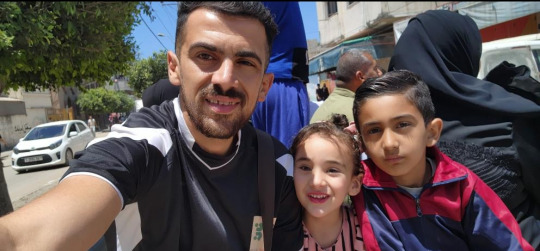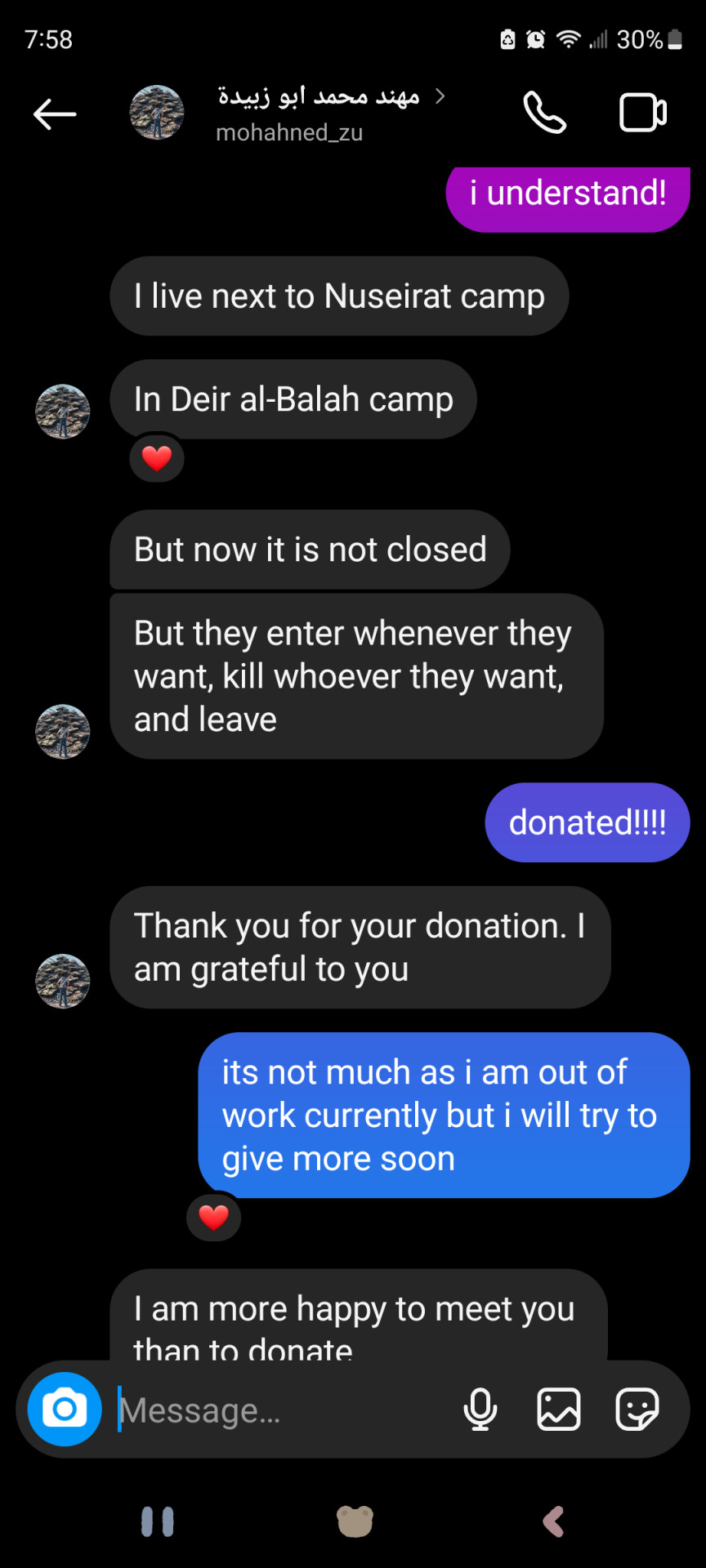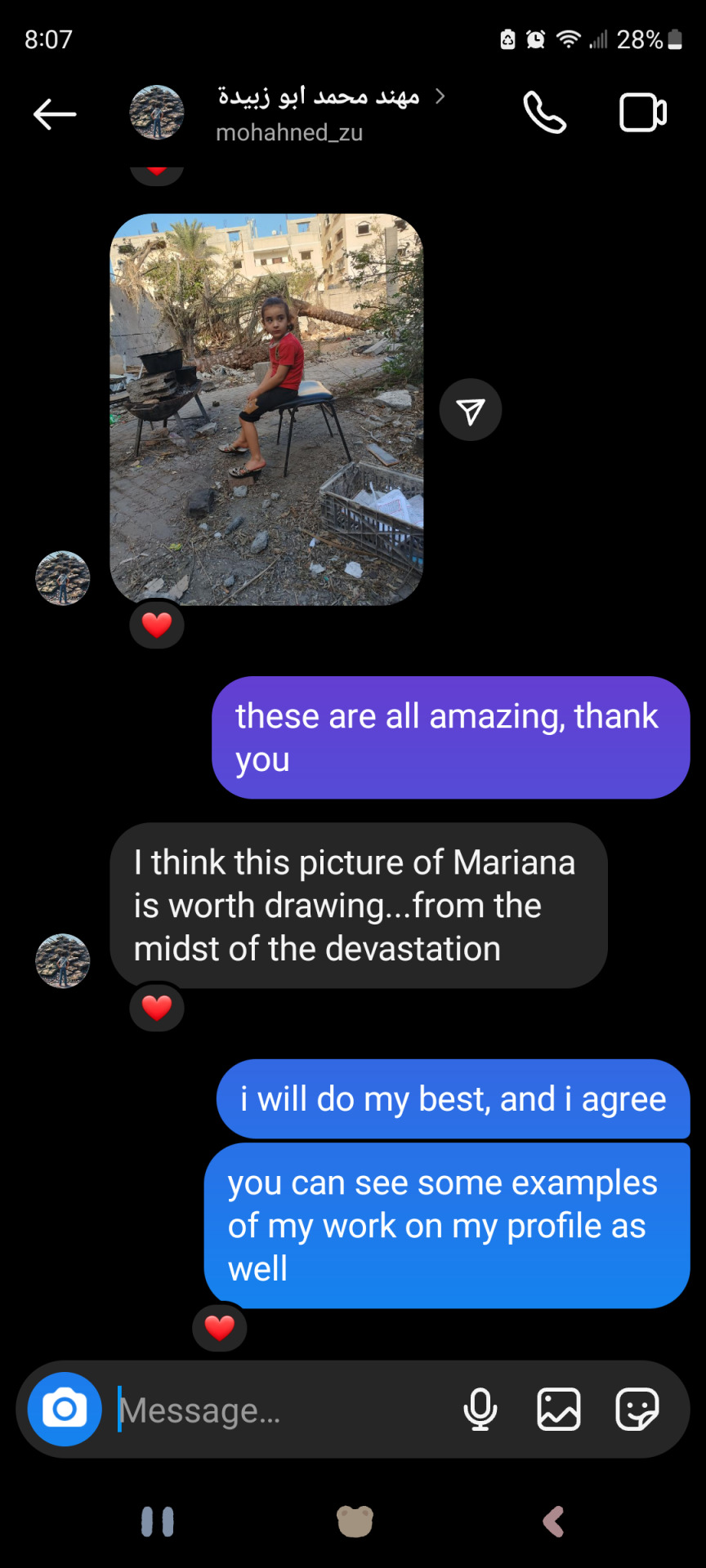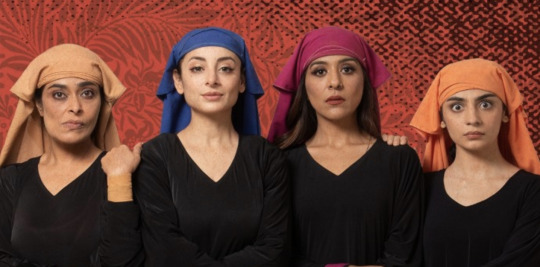#Zubaida
Explore tagged Tumblr posts
Text

Egyptian actress Zubaida Tharwat, 1969.
2 notes
·
View notes
Text
AVM Kennedy Mataluwo is rare among his Contemporaries! Hajiya Zubaida Umar
By Bello Ahmadu AlkammawaThe Director General of National Emergency Management Agency Hajiya Zubaida Umar had said that, the recent promotion of the Agency’s Director, Search and Rescue, AVM Kennedy Mataluwo is well-deserved going by his good track records which makes him to write his name on platter of gold in everything that will actualize the good dreams of the agency and Nigerian Air Force as…
0 notes
Text










1956 Dalila first Egyptian movie in CinemaScope
0 notes
Text
Please Help the Zubaida Family Anyway You Can!
Hello! One of my close irl friends who has been in close contact with Mohannad Abu Zubaida, who is trying to escape to Egypt with his wife and three kids, reached out to me asking if I can help spread his campaign in any way that I can! Unfortunately we were not able to donate much, but in response we are going to be drawing art for Mohannad and his family to help spread this campaign the best that we can! In the meantime if you can share this post that would be amazing and if you are interested in drawing art as well, please do! Feel free to contact me if so or if you would like more information.




#art#idk what to tag this as i dont want it to get censored or anyhting#but please rb and share#it would mean so much
631 notes
·
View notes
Text












I've recently been contacted by an associate of the Zubaida family and worked with them to make an art piece for their relief campaign. Please share this work with others to spread word and d/nate to their campaign if you can! Here is another post with more information about their journey. Thank you!
261 notes
·
View notes
Text
الجمال المصري
#زبيدة_ثروت #سينما
Natural Egyptian beauty
Retro celebrity Actress
Zubaida Tharwat
#beauty #Egyptian #Actress #vintagestyle #Cinema
58 notes
·
View notes
Text

Churails (2020)
by Asim Abbasi
Churails is a pakistani drama web series directed by Asim Abbasi for the indian entertainment channel Zindagi.
The series deals with four maincharacters, Zubaida, who is a college student and a secret boxer, who lives with her muslim, conservative family.Sara, who is a rich housewife of a politcian and an ex lawyer, Jugnu, an elite wedding planner and Batool, who just currently was released out of prison for killing her husband with an iron. Those four women connect trough different circumstances after Sara finds out her husband Jamil was cheating on her. She starts a burka store called halal designs, which runs undercover a cheating husband exposing bizniz. They find a time of other women for their bizniz and together they deal with their intense cases, one including a cannibal housewife. Together they are Churails, which means witches in urdu. چڑیل
The pace of the series is very fast. Many unexpected and expected stories happen under the churails. I haven't seen a show in a while with such intense story telling. Within short time as an audience you develop a good base of the character development. There is trans representation within the show and even LESBIANS.
Besides the complex society and class rules within their life and the personal dramas intertwined, the series is also dealing with colonial past, lgbtqia* issues, misogyny and racism within pakistani society ( I assume? I never been to Pakistan, so I can't tell actually, but within this show all those struggles are addressed) Abbasi said about including baby doll : "The fact that she’s transgender is not addressed on the show and that is deliberate. It’s not that I was overlooking her identity or ashamed of it. It was to show the women coming to the agency were all equal.” The title of the show literally translates to mean witches, but is more commonly used as an insult for rebellious women. “The associations of women who don’t conform with witchcraft is a global phenomenon, but in Pakistan specifically, any woman who is sexually and emotionally liberated, who has the ability to be aggressive when threatened is called a churail. We are taking it as a badge of honour.”
I love this show a lot, since besides those awful and heartbreaking stories, the main reason to watch this show are the amazing female characters, the friendship between those women and their will to fight injustice. They are kind of superheros I would say. Also I was very surprised by a positive depicition of men, who are part of the churails and help them to solve their cases, to do something right. I think it's important to show solidarity between gender depictions within a tv show for a possible utopia? Like call me out if I'm wrong but usually its women* playing supportive roles in a all men cast, we saw it many many times. But here the guys are the enemies, but as well there are supportive characters? So show a different path to follow.


Unfortunately the show was banned in Pakistan and many celebrities voices their anger about the canceling of the show.
Considering writing about this show, since it's not made by a queer of female director I had my issues. After researching deeper into the revolutionary cloud of this show, i find out its the first lesbian on screen show ever in Pakistan. in an interview with the guardian Abbasi said: “While we aren’t where we should be in terms of diversity, we have to start somewhere and adaptations are culturally rich,” said Abbasi. “You could say that Churails should have been made by a woman, but those opportunities aren’t there for women in Pakistan yet so I want to be an ally so their stories can be told.”
So I hope you guys forgive me, but I feel like it's worth to see all those actresses and this amazing story and yeah we are all in this together. <3 Cuz at the end of the day, i love the power of image making. I learn trough visual language about language ( literally speaking three languages daily I need to see a picture in my head if you talk to me).
Also I promise for my next review to write about a kazakhstani film, since i feel like many things in the show I couldn't understand out of lack of cultural knowledge, so it's time to write about something that I might be able to understand. And still I think it's very important to show my chapeau for this show. What a ride. Literally i was crying like many times. The actresses and actors were out of league. Like I was actually waiting daily from my moneyjobs to come home to see what the churails are fighting next.
ok by
cheery,
the queeeerview heheheh
10 notes
·
View notes
Text
“The fact that a quarter of women are currently undecided which way to vote should make parties sit up and notice.”
With a general election on the horizon in the next year or so, the Women’s Budget Group and YouGov have looked into the public’s voting intentions – and found that women will very likely swing which political party takes power in the UK.
The new data shows that around 25% of women are currently undecided on how they will cast their vote, compared to 11% of men. This represents a significant proportion of the electorate that would swing the vote between either Labour or the Conservatives.
The survey also found that Labour has a larger lead among women than men, with women being as likely as men to vote Labour but less likely to say they’ll vote Conservative.
The likelihood of women voting Labour is higher among young women (44%). As age increases, Labour’s lead decreases, with the Conservatives in the lead in women over 65 (27%). However, women have been more inclined to vote Labour overall with each successive generation.
The YouGov data also shows that political priorities between women and men in the UK are broadly similar, but do contain a few key differences – namely when it comes to the NHS and caring responsibilities.
Nearly two thirds of women (64%) named the NHS as a top priority in the next general election, compared to just under half of men (48%). Women are also more likely to prioritise the cost of living crisis in their voting intentions, with 52% of women considering this a top priority compared to 47% of men. Climate change and the environment is also a priority for a higher proportion of women than men (30% vs 26% respectively).
The report by the Women’s Budget Group states it is “unsurprising” that women list the cost of living crisis as a priority, “since women are the majority of those who provide unpaid care, which makes them more likely to be economically inactive, in low-paid, part-time, or precarious forms of work. Women are therefore less prepared to face the rising cost of living and more likely to be dependent on social security and public services.”
The two areas that men are more likely to prioritise than women are the economy (a key issue for 44% of men, compared to 28% of women) and immigration (27% of men vs 20% of women).
Women with caring responsibilities were more likely to prioritise care and education services compared to the average voter, with those caring for adults more than twice as likely to name social care as one of their top three priorities in their vote.
And women caring for children are more than three times as likely than the average voter to list childcare as one of their top priorities, with 35% naming education as a key voting issue for them, too.
“Women represent over half of eligible voters,” said Dr Zubaida Haque, deputy director and head of research at the Women’s Budget Group. “The fact that a quarter of women are currently undecided which way to vote should make parties sit up and notice.
“While the polling data indicate the continuation of a generational trend of women voters moving away from Conservatives and towards Labour, our polling shows that women’s votes are in no way guaranteed and should not be taken for granted by any political party.”
With a general election on the horizon in the next year or so, the Women’s Budget Group and YouGov have looked into the public’s voting intentions – and found that women will very likely swing which political party takes power in the UK.
T he new data shows that around 25% of women are currently undecided on how they will cast their vote, compared to 11% of men. This represents a significant proportion of the electorate that would swing the vote between either Labour or the Conservatives.
The survey also found that Labour has a larger lead among women than men, with women being as likely as men to vote Labour but less likely to say they’ll vote Conservative.
The likelihood of women voting Labour is higher among young women (44%). As age increases, Labour’s lead decreases, with the Conservatives in the lead in women over 65 (27%). However, women have been more inclined to vote Labour overall with each successive generation.
The YouGov data also shows that political priorities between women and men in the UK are broadly similar, but do contain a few key differences – namely when it comes to the NHS and caring responsibilities.
Nearly two thirds of women (64%) named the NHS as a top priority in the next general election, compared to just under half of men (48%). Women are also more likely to prioritise the cost of living crisis in their voting intentions, with 52% of women considering this a top priority compared to 47% of men. Climate change and the environment is also a priority for a higher proportion of women than men (30% vs 26% respectively).
The report by the Women’s Budget Group states it is “unsurprising” that women list the cost of living crisis as a priority, “since women are the majority of those who provide unpaid care, which makes them more likely to be economically inactive, in low-paid, part-time, or precarious forms of work. Women are therefore less prepared to face the rising cost of living and more likely to be dependent on social security and public services.”
The two areas that men are more likely to prioritise than women are the economy (a key issue for 44% of men, compared to 28% of women) and immigration (27% of men vs 20% of women).
Women with caring responsibilities were more likely to prioritise care and education services compared to the average voter, with those caring for adults more than twice as likely to name social care as one of their top three priorities in their vote.
And women caring for children are more than three times as likely than the average voter to list childcare as one of their top priorities, with 35% naming education as a key voting issue for them, too.
“Women represent over half of eligible voters,” said Dr Zubaida Haque, deputy director and head of research at the Women’s Budget Group. “The fact that a quarter of women are currently undecided which way to vote should make parties sit up and notice.
“While the polling data indicate the continuation of a generational trend of women voters moving away from Conservatives and towards Labour, our polling shows that women’s votes are in no way guaranteed and should not be taken for granted by any political party.”
5 notes
·
View notes
Text

perfectly normal number of tundras (and Zubaida cuz she gets to stay next to her mate)
#g postin#dragon share#still gotta name the brown F tundra ^o^#idk y I'm enjoying dragons with some basic genes lately especially tuns
6 notes
·
View notes
Text
Poor planning & lack up crowd control are the genesis of Stampedes in Nigeria-Zubaida Umar
By Bello Ahmadu AlkammawaThe Director-General of the National Emergency Management Agency (NEMA), Mrs. Zubaida Umar, said the genesis behind the recent stampedes that happens in three major cities of the country has to do with poor planning and lack up crowd control, she therefore called for proper crowd management during distribution of charity to prevent such disaster that send many innocent…
0 notes
Text
BHARAT GAURAV AWARD:

List Of Award Winners -
Mohammad Omer Farooq
Dr. Sujit Kumar Choudhary
Dr. Mayaa SH
Aakash Kumar Singh ( AAKASH OFFICIAL )
Chenjerai Mhondera
Shroddha Mukherjee
Bagal Swati Vitthalrao
MANJU PREETHAM KUNTAMUKKALA
Dr. Rani Shukla
Dr Zubaida Anwar
Dr Suresh Kumar Agarwal
A.K .Aazad
Anjali Saxena
Vandana Nalini Singh
Lion Dr. Medisetty Venkateswarlu
Nida Heer
Dr. Brajesh Barnwal
Sukhmila Agarwal
Kavita Kothari
Ashish Kumar
डॉ.विश्वनाथ देवांगन'मुस्कुराता बस्तर'
Aseera
त्र्यम्बक राव साटकर "अम्बर"
शारदा कनोरिया
Archana Singh
Pragati Dutt
रेखा अग्रवाल
S.P Shrimali
Manju Lagote
Mr. Kasam Azad
0 notes
Text
Zubaidas

Finding high-quality baby products, home essentials, and kitchen appliances under one roof is no longer a challenge—Zubaidas has made it easy. With multiple outlets across major cities & a user-friendly online store, we offer a seamless shopping experience for families looking for premium baby gear, household items, and home furniture. Our commitment to quality, affordability, and customer satisfaction has made us a trusted name in the industry. A Wide Range of Products to Meet Your Needs At Zubaidas, we understand that every home has unique needs. That’s why we offer a diverse selection of products to make life easier and more comfortable for our customers. 1. Baby Accessories & Baby Gear Parenting comes with many responsibilities, and having the right baby products makes all the difference. Our stores stock a complete range of baby essentials, including: Baby Strollers & Car Seats – Ensure your little one’s safety and comfort. Feeding Essentials – Bottles, sterilizers, and high chairs for easy feeding. Diapers & Hygiene Products – Trusted brands to keep your baby comfortable. Toys & Educational Items – Engaging and safe toys to support early learning. 2. Home & Kitchen Appliances Upgrade your kitchen and home with our top-quality appliances, featuring the latest technology and energy efficiency. We offer: Refrigerators & Deep Freezers – Preserve food with reliable cooling solutions. Microwaves & Ovens – Cook meals quickly and efficiently. Blenders & Juicers – Make healthy drinks effortlessly. Washing Machines & Vacuum Cleaners – Keep your home spotless with ease. 3. Home Furniture & Household Essentials Transform your living space with our stylish and durable home furniture and décor. We provide: Sofas & Beds – High-quality designs for ultimate comfort. Dining Tables & Chairs – Elegant furniture for your dining space. Storage Solutions – Wardrobes, shelves, and cabinets for an organized home. Décor & Accessories – Rugs, curtains, and decorative items to enhance your home’s ambiance. Why Choose Zubaidas? At Zubaidas, we go beyond selling products—we provide an exceptional shopping experience that keeps customers coming back. Here’s why we stand out: 1. Quality You Can Trust We believe in offering only the best. Every product in our stores undergoes strict quality checks to ensure durability, safety, and performance. 2. Exclusive Deals & Discounts We regularly offer special promotions and discounted prices on a variety of products, helping our customers get the best value for their money. 3. Secure Transactions Shop with peace of mind! Our online and in-store payment methods are 100% secure, ensuring a hassle-free buying experience. 4. Hassle-Free Returns & Customer Support We understand that sometimes, purchases might not meet expectations. That’s why we offer an easy return policy and dedicated customer support to assist with any concerns. 5. Nationwide Presence - Online & Offline With multiple outlets across major cities and a user-friendly online store, Zubaidas is accessible to customers across the country. Whether you visit our stores or online shopping, we ensure a seamless experience. Your Home, Your Lifestyle – Shop at Zubaidas From baby essentials to kitchen appliances, from home décor to quality furniture—Zubaidas is your ultimate destination for all household needs. We are dedicated to providing high-quality products at unbeatable prices, ensuring that every purchase adds value to your home and lifestyle. Visit Us Today! Looking for the best deals on baby gear, home appliances, and furniture? Visit your nearest Zubaidas outlet or shop online to explore our latest collections. Experience convenience, affordability, and quality—all in one place! Zubaidas – Bringing Comfort, Style, and Innovation to Your Home. Read the full article
0 notes
Text
Anti-Spill Locks Key to Mitigating Tanker Disasters in Nigeria - Peter Mbah
Governor of Enugu State, Dr. Peter Mbah, has reiterated his call for the enforcement of anti-spill lock on fuel tankers across the country, saying that disasters arising from tanker-spill had become too frequent. Mbah restated the call on Tuesday when he received in his office the Director-General of the National Emergency Management Agency, NEMA, Mrs. Zubaida Umar, and her team who were in…
0 notes
Text
Recensione di "Grazie Padre, Grazie Madre"
La poesia "Grazie Padre, Grazie Madre" di Zubaida Uzokova è un’intensa celebrazione dell’amore filiale e della gratitudine verso i genitori
La poesia “Grazie Padre, Grazie Madre” di Zubaida Uzokova è un’intensa celebrazione dell’amore filiale e della gratitudine verso i genitori. Con versi semplici ma carichi di significato, l’autrice esplora il profondo legame emotivo che la unisce al padre e alla madre, trasmettendo un messaggio universale che risuona con chiunque abbia sperimentato l’amore familiare. I versi si aprono con un…
#Alessandria today#amore filiale#amore incondizionato#amore universale#articoli scientifici#celebrazione della famiglia#conferenze internazionali#dipartimento piante medicinali#Emozioni#Famiglia#Genitori#Google News#gratitudine#Il primo passo#italianewsmedia.com#Kashkadarya#Kitab#legame spirituale#legami familiari#letteratura uzbeka.#Libro di poesie#lingua turca#madre e padre#montagna del cielo#nostalgia#Pier Carlo Lava#Poesia#poesia emozionale#poesia internazionale#poesia moderna
0 notes
Text
Cord Set for Women Party Wear
Discover the perfect cord set for women party wear to make a stunning statement at any celebration. Designed for elegance and comfort, these coordinated sets offer a chic, effortless look. Elevate your party wardrobe with Zubaida's exclusive collection. Shop now and redefine your style with our premium party wear sets!
1 note
·
View note
Text
Zubaida Lyrics
Singer:Nanku, NatiqAlbum:Nanku, Natiq Bechara dil becharaTujhse kar cope ni paaraKoi chance, na scope, na chaaraMujhse tere liye khat likhwaa ra Bechara dil becharaKuch dino se mere haath ni aa rhaaKoi chance, na scope, na chaaraAinvein apna ghamand ghiswaa ra Aisa bhi hota haiCupid bhi rota haiSochun tere baare mein toSeene mein kuch hota hai Na koi samjhauta haiNa mera dil iklauta haiUtaar…
0 notes